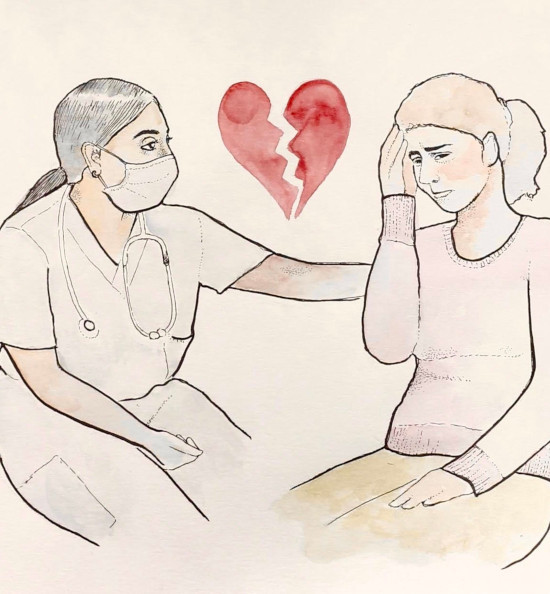Culturally appropriate care for Manitoba survivors
Forensic nurse partnership assists domestic violence victims

Illustration by Gabrielle Funk
The expansion of a forensic nursing program at two community clinics will help survivors of sexual assault and domestic violence access trauma-informed and culturally appropriate care.
Klinic Community Health and Ka Ni Kanichihk formed a partnership to create the Sexual Assault and Intimate Partner Violence Crisis Response Program, which soft-launched in October but began fully operating on Jan. 17.
Members from the West Broadway-area health centre and Indigenous-led non-profit believe the program will help fill in systemic gaps for Indigenous women and Two-Spirit people.
“As a nurse and as a forensic nurse, I know and recognize the short- and the long-term effects of violence ... and its emotional impacts, medical impacts, impacts to one’s cultural and spiritual well-being,” Ashley Stewart says.
“It’s really important to me to have a place where we can offer as many types of services that person needs in order to start on their healing journey.”
Stewart, a coordinator at Klinic, says the program uses cultural practices to create a safer space for people experiencing intimate-partner violence, and it amplifies the existing services already offered.
Survivors can choose what supports best fit their needs and have access to smudging and support from aunties and kokums, along with testing and medication for sexually transmitted and bloodborne infections (STBBIs) and unwanted pregnancies.
Stewart says victims can receive care any time after experiencing domestic violence. If they come in shortly after an incident has occurred, nurses can help collect forensic evidence so it can be sent to police for investigation, with the victim’s consent.
Trained nurses also provide trauma support for survivors who don’t need emergency medical care at a hospital.
“Our program also will see people who come from any background, any gender, and we will provide that service to them, (too),” Stewart says.
The program has helped 38 people in the last three months between the two locations. At full capacity, the program can support up to 300 people.
Before, Health Sciences Centre was the only facility that offered forensic exams. It sees roughly 700 patients annually.
“We’ve really tried to ensure that survivor voices are at the heart of the work that we’re doing,” Dana Connolly, Ka Ni Kanichihk’s associate executive director, says. “Investing in Indigenous communities is critical. (It’s) going to be critical to supporting women in Manitoba across the board.”
Indigenous women are disproportionately affected by domestic violence in Manitoba, Canada and the world. About 44 per cent of Indigenous women in Canada experience physical or sexual violence from a partner in their lifetime, according to data released in 2022 by Statistics Canada.
The same records show only 25 per cent of non-Indigenous women reported intimate-partner abuse. Indigenous women are also more likely to face violence from non-partners, including friends and strangers.
“We’re really excited to be able to offer this service, because we know that Indigenous women are overrepresented in sexualized violence,” Connolly says. “It’s so critical for us to have Indigenous-led services for Indigenous people.”
Forensic nurses are available at Klinic located at 167 Sherbrook St. Monday through Thursday from 9 a.m. to 7:30 p.m., Fridays from 9 a.m. to 4 p.m. and Saturdays from 10 a.m. to 3 p.m.
Ka Ni Kanichihk at 102-765 Main St. offers forensic examinations on Tuesdays and Thursdays from 8:30 a.m. to 4:30 p.m.
Victims of domestic violence are encouraged to call Klinic’s crisis line at 204-786-8631.
Published in Volume 78, Number 16 of The Uniter (February 1, 2024)






